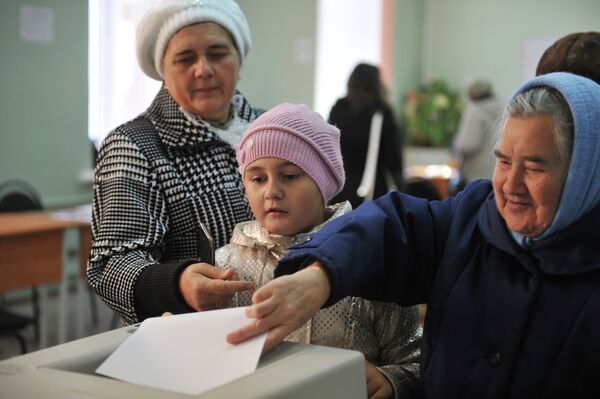The ruling United Russia party reaffirmed its dominance across Russia's political landscape in regional elections on Sunday, further eclipsing the country’s nascent opposition.
The opposition now needs to see if it can finally move beyond just producing anti-government protests and establish credibility outside its traditional base in Moscow, analysts said.
The momentum of the protest movement tailed off earlier this year, causing opposition leaders to seek to harness popular discontent in the first nationwide elections since last March’s presidential poll.
But by early Monday, it was clear United Russia had swept all five of the country’s gubernatorial elections – the first since 2005. These elections carried particular significance as the State Duma reinstated direct elections for regional governors earlier this year, in a concession to the anti-Kremlin movement.
Pro-Kremlin governors were elected in the Amur, Belgorod, Bryansk, Novgorod and Ryazan Regions, with candidates there claiming between 64 and 77 percent of the vote.
In some instances, even seemingly unpopular incumbents won easily against their opponents. Bryansk Governor Nikolai Denin, for example, walked away with just over 65 percent of the vote.
The popular perception of the opposition as all talk and no action contributed to United Russia’s sweep, said Alexei Mukhin, an analyst at the Center for Political Information think-tank.
“People are simply fed up with opposition leaders criticizing the government – they’re waiting for some kind of concrete proposals,” he said.
Prime Minister Dmitry Medvedev, United Russia’s official leader, praised his party for performing better than it did during last December’s hotly contested parliamentary elections. President Vladimir Putin, meanwhile, said the results were "not unexpected," adding that the vote reflected Russians' support for the state and its institutions.
A total of 4,866 elections were held in 77 regions across Russia, according the Central Election Commission, the majority of them for mayoral and local council posts.
In elections to local legislatures, United Russia saw more varied results, ranging between 38 and 51 percent. The Communist Party routinely came second in those polls, typically securing between 14 and 20 percent of the vote.
Firebrand eco-activist Yevgenia Chirikova waged a high-profile campaign in the Moscow Region’s closely-watched Khimki mayoral elections, but garnered only about 17 percent of the vote against United Russia candidate Oleg Shakhov’s 47.5 percent.
The opposition saw that contest as an opportunity to boost the movement’s electoral credibility in a location where it seemed to have a fighting chance.
But according to Mukhin, Chirikova misjudged her electorate. “Khimki is all about management,” he said. “Despite her three higher degrees, [Chirikova] doesn’t have any experience in real management.”
In a throwback to previous elections, however, opposition candidates and independent vote monitors cried foul throughout Sunday over what they alleged to be mass falsification across the nationwide vote.
Independent vote monitor Golos registered more than 1,100 violations across Russia on its website. United Russia registered just 51 violations nationwide, according to Artem Turov, a senior official in Young Guard, the party’s youth wing.
The elections were also marred by low turnout rates, which experts said was a result of “election fatigue” (the elections were the third in nine months) and political apathy among the population.
In the Bryansk, Ryazan, and Amur gubernatorial elections, for example, voter turnout hovered around 34 percent. The figure was even lower for elections to local legislative bodies, with cities such as Vladivostok and Petropavlovsk-Kamchatsky registering a meager 11 and 14 percent, respectively.
Some opposition activists claimed United Russia’s victory was largely a product of the turnout.
“With such extremely low turnout, there’s nothing for them to be proud of,” Democratic Choice leader and Putin critic Vladimir Milov wrote in Gazeta.ru on Monday. “The picture will be entirely different during the next federal election cycle.”
Experts echoed that sentiment, with some noting that the low turnout rates – while not new for Russian regional elections – played into the ruling party’s hands.
“When United Russia claims a 70 percent victory, it’s actually a very small minority if the turnout is under 20 percent,” said Masha Lipman, a politics and society expert at the Carnegie Moscow Center.
These elections were the first since the State Duma’s amendment earlier this year of an election law which eased the registration process for political parties. Now, a party requires only 500 members – as opposed to 40,000 earlier – to officially register.
Valery Sorokin, leader of New Russia, one of the 40 or so new parties that registered in time for Sunday’s elections, saw some hope for fledgling parties. While his party rarely broke the 3 percent mark in a handful of regional contests, he said the elections were an exercise in preparation.
“The experience of [going through] an election campaign will allow us to analyze these elections and…prepare for elections next fall,” he told RIA Novosti late on Sunday.




